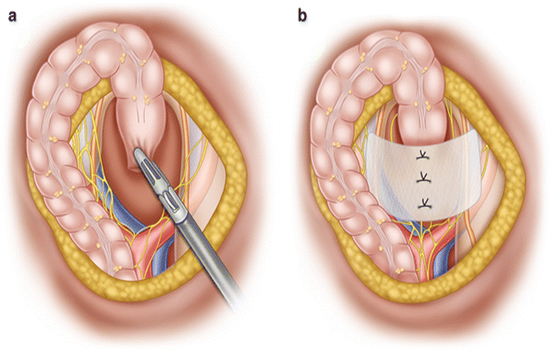Best rectopexy surgeon in delhi
Laparoscopic Rectopexy
Laparoscopic rectopexy is a surgical procedure used to treat rectal prolapse. This condition is characterized by a protrusion of the rectum through the anus, often caused by a weakness or total loss of the normal support structures of the rectum. Rectal prolapse is characterized by a number of symptoms, including bleeding, severe discomfort, mucus leakage, and fecal incontinence. To know about Laparoscopic Rectopexy meet our Best Laparoscopic Rectopexy surgeon in Delhi, Dr. Sukhvinder Singh Saggu.
While a rectal prolapse may cause significant pain and disturbance in a person’s life, it is totally curable with laparoscopic rectopexy, a minimally invasive surgery intended to restore damaged or compromised rectal support systems. Rectopexy surgery, which is a laparoscopic technique, is often conducted via a very small incision in the abdomen. A laparoscope is then introduced through the incision and precisely positioned to provide the surgeon with enough view to complete the procedure.

How is laparoscopic rectopexy performed?
During a laparoscopic rectopexy, the patient is given anesthetic before the surgery begins. The surgery then begins, with the surgeon making a few small incisions in the patient’s abdomen through which a laparoscope (a thin medical instrument with a high-intensity light and a high-resolution camera at its end) and other surgical tools designed specifically for laparoscopic procedure are inserted to repair the prolapsed rectum.
Can rectal prolapse reoccur after laparoscopic rectopexy?
The chances of recurrence are extremely low after laparoscopic rectopexy because the surgeons use surgical mesh instead of regular stitches to fix the protruding rectum. The surgical mesh keeps the rectum in place, preventing the patient from having a repeat prolapsed rectum.
What precautions should a patient take after a laparoscopic rectopexy?
- Drink plenty of water and other fluids, such as fruit juices and coconut water, and eat plenty of fresh fruits and vegetables (after the soft diet phase is over)
- Sports and other outside activities should be avoided.
- Do not engage in any vigorous exercise, including heavy lifting.
- Take plenty of rest and sleep
- Wear loose clothes and keep your surgical wounds fresh and clean to avoid infections.
- Check in with your doctor for post-surgery check-ups.
- Your doctor may advise you to use stool softeners after surgery to avoid constipation and recurring prolapsed rectum.
What are the Benefits of Laparoscopic Rectopexy?
- Minimal incisions
- Low or no blood loss
- Minimal chances of infection
- Reduced hospital stay
- Quick recovery
- Higher success rate
- Completely safe.
- As a result, laparoscopic rectopexy is much more popular and in high demand than traditional open surgery.
Book an appointment with Dr. Sukhvinder Singh Saggu, Best Laparoscopic Rectopexy surgeon in Delhi
Frequently Asked Questions
- What is the safest surgery for rectal prolapse?
Ans. A rectal prolapse is not life-threatening. The goal of surgery is to alleviate its symptoms providing long-term relief. An abdominal rectal prolapse surgery offers better long-term results and is safe by all means.
- What is the duration of Rectopexy?
Ans. A laparoscopic rectopexy is performed under general anesthesia, taking between 2 to 3 hours in total. It involves a little cut just below the belly button and 2 to 3 small cuts on the stomach. Minimal cuts and no bleeding makes it a safe and successful procedure.
- What are the complications after Rectopexy?
Ans. Some of the common complications of rectopexy and mesh migration, anal fistulas, anastomotic leak, large bowel (intestinal) obstruction, sexual dysfunction, and worsening constipation or urinary tract infections.
- Is a prolapse operation serious?
Ans. It’s a major surgery and requires precision. If not performed well, it carries severe risks of bleeding, bowel obstruction, infection, recurrence of rectal prolapse, sexual dysfunction, fistula, or development of new or worsened constipation.
- What are the chances of recurrence of rectal prolapse after the surgery?
Ans. The chances of recurrence are extremely low, especially after laparoscopic rectopexy, where the surgical mesh is used instead of regular stitches to fix the protruding rectum. It prevents having a repeat prolapsed rectum by keeping it in the correct position.
